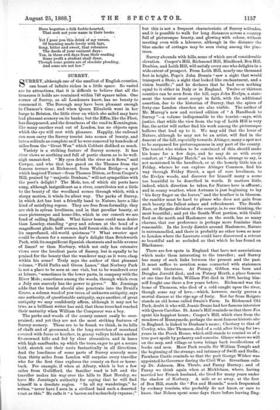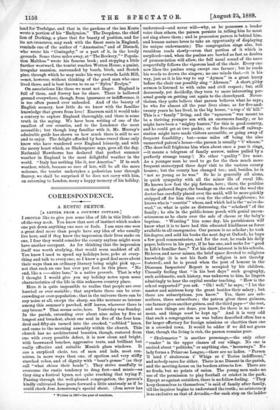SURREY.
SURREY, although one of the smallest of English counties, can boast of infinite riches in a little space. So varied are its attractions, that it is difficult to believe that all the treasures it holds are contained within 748 square miles. One corner of Surrey, as all Londoners know, has no beauty to commend it. The Borough may have been pleasant enough in Chaucer's time ; and when Queen Elizabeth went in her barge to Brixton, the little river on which she sailed may have had pleasant scenery on its banks; but the Effra, like the Fleet, has disappeared, and the dreariness of the road to Kennington, like many another road out of London, has no objects upon which the eye will rest with pleasure. Happily, the railroad can soon carry the Surrey tourist into scenes of beauty, and into a solitude as complete as if he were removed by hundreds of miles from the "Great Wen" which Cobbett disliked so much.
Variety is a striking feature of Surrey scenery. It has river views so soothing and full of poetic charm as to be well- nigh unmatched. "My. eyes drink the river as it flows," said Cowper, and who that has gazed on the Thames from the famous terrace at Richmond, from Walton Bridge—a spot which inspired Turner—from Thames Ditton, or from Cooper's Hill, praised by majestic Denham," will not sympathise with the poet's delight ? The Mole, too, of which six poets have sung, although insignificant as a river, contributes not a little to the beauty of the woodland scenes through which, with a sleepy motion, it winds its silent way. The parks of Surrey, in which Art has lent a friendly hand to Nature, have a like kind of satisfying repose. They are free from formality, they are rich in sylvan loveliness, and in that peculiar beauty, at once picturesque and home-like, which in our conceit we are fond of calling English. What fairer home could man desire than Loseley, standing "grey and solemn at the head of a magnificent glade, half avenue, half forest-ride, in the midst of its unprofaned, old-world quietness" P What sweeter spot could be chosen for a summer day's delight than Betchworth Park, with its magnificent Spanish chestnuts and noble avenue of limes P or than Norbury, which not only has extensive views over the loveliest parts of Surrey, but is equally to be praised for the beauty that the wanderer may, as it were, clasp within his arms ? Truly says the author of that pleasant volume, "Field Paths and Green Lanes," that Norbury Park is not a place to be seen at one visit, but to be wandered over at leiSure, "sometimes in the lower parts, in company with the. River Mole ; sometimes among the woods, through which even a July sun scarcely has the power to pierce." Mr. Jennings. adds that the tourist should also penetrate into the Druid's Grove, a solemn wood of yew-trees, of unknown antiquity, says one authority, of questionable antiquity, says another, of great antiquity we may confidently affirm, although it may not be true, as a brilliant writer has said, that these trees had reached their maturity when William the Conqueror was a boy.
The parks and woods of the county cannot easily be over- praised; and yet they are not the most striking features of Surrey scenery. These are to be found, we think, in its hills of chalk and of greensand, in the long stretches of moorland covered with furze or heather, in grassy valleys hidden amidst fir-crowned hills and fed by clear streamlets, and in lanes with high sandbanks, up which the trees, eager to get a secure hold, stretch out their roots fantastically in all directions. And the loneliness of some parts of Surrey scarcely more than thirty miles from London will surprise every traveller who for the first time explores the county on foot or horse- back. For example, if when at Albury, which is but a few miles from Guildford, the familiar road is left and the traveller makes his way over the hills to East Horsley, we have Mr. jennings's authority for saying that he will find himself in a desolate region. "In all my wanderings," he writes, "never have I seen in a civilised land such a deserted tract as this." He calls it "a barren and melancholy expanse ;"
but this is not a frequent characteristic of Surrey solitudes, and it is possible to walk for long distances across a country full of picturesque beauty, and glowing .with colour, without meeting even with a labourer, although in the distance the blue smoke of cottages may be seen rising among the pine. trees.
Surrey abounds with hills, some of which are of considerable elevation. Cooper's Hill, Richmond Hill, Hindhead, Box Hill, Denbies, and Leith Hill, will satisfy every one who delights in a wide extent of prospect. From Leith Hill, nearly one thousand feet in height, Pope's John Dennis "saw a sight that would transport a Stoic, a sight that looked like enchantment, and a vision beatific ;" and he declares that he had seen nothing equal to it either in Italy or in England. Twelve or thirteen counties can be seen from the hill, says John Evelyn, a state- ment the tourist must accept in faith, with the additional assertion, due to the historian of Surrey, that the spires of forty-one London churches are also visible. The author of Mr. Murray's new and revised edition of "A Handbook to Surrey "—a volume indispensable to the tourist—says, with justice, that while the view from the top of Leith Hill is very fine, the artist will rather find his work among the picturesque hollows that lead up to it. We may add that the lover of Nature, although he may not be an artist, will find in the descent of the hill, especially towards Abinger, many a spot not to be surpassed for picturesqueness in any part of the county. The tourist who wishes to be convinced of this, should make his home for a few days, and he may do so with every comfort, at "Abinger Hatch," an inn which, strange to say, is not mentioned in the handbook, or at the homely little inn at Felday, whence he can explore Abinger Common, find his way through Friday Street, a spot of rare loveliness, to the Evelyn woods, and discover for himself many a scene too beautiful to be described in words. It matters little, indeed, which direction he takes, for Nature here is affluent; and in sunny weather, when Autumn is just beginning to lay "his fiery finger on the leaves," and the heather is in blossom, the rambler must be hard to please who does not gain from such beauty the fullest solace and refreshment. The South- East, or Reigate division of the county, is, to our thinking, the most beautiful ; and yet the South-West portion, with Guild- ford on the north and Haslemere on the south, has so many charms, that our preference is perhaps more feminine than reasonable. In the lovely district around Ha.slemere, Nature is untrammelled, and there is probably no other town so near to London where the Laureate could have discovered a retreat so beautiful and so secluded as that which he has found on Blackmoor.
There are few spots in England that have not associations which make them interesting to the traveller; and Surrey has many of such links between the present and the past. It must suffice to mention some connected with statesmen and with literature. At Putney, Gibbon was born and Douglas Jerrold died; and on Putney Heath, a place famous at one time for duels, William Pitt died in 1800, having- him- self fought one there a few years before. Richmond was the home of Thomson, who died of a cold caught upon the river, though, some say of love,—which, however, rarely proves a mortal disease at the ripe age of forty. Not far from Reigate stands an old house called Swain's Farm. In Richmond Old Park, doubt it who will, Jeanie Deans had her famous interview with Queen Caroline. St. Anne's Hill reminds us that there Fox
spent his happiest hours ; Cooper's Hill, which rises from the meadows of Runnymede, perhaps the most famous historic site in England, is linked to Denham's name ; Chertsey to that of Cowley, who, like Thomson, died of a cold, after living for two years in the Porch House, which still stands to remind us of a true poet spoilt by pedantry and conceits. Glance where we will on the map, and village or town brings back recollections of books and men. Moor Park recalls Sir William Temple and the beginning of the strange, sad intimacy of Swift and Stella; Farnham Castle reminds us that the poet George Wither was appointed its Governor during the Civil War. Streatham calls up Dr. Johnson. Mrs. Thrale, and Fanny Burney; and of Fanny we think again when at Mickleham, where, having married her French husband, she lived for many years under
the shadow of Norbury. A. mile or so away, at the foot of Box Hill, stands the "Fox and Hounds," much frequented by cockney tourists, who probably do not know, or care to know, that Nelson spent some days there before leaving Eng.
land for Trafalgar, and that in the gardens of the inn Keats wrote a portion of his "Endymion." The Deepdeue, the chief lion of Dorking, a place that for beauty of position, and for its art-treasures, may rank with the finest seats in England, reminds one of the author of " Anastasius," and of Disraeli, who wrote his " Coningsby," or a part of it, in the lovely grounds. Some three miles away, at " The Rookery," " Popula- tion Malthus" wrote his famous book ; and stepping a little farther westward, the tourist reaches Wotton House, a quaint, irregular mansion, surrounded by beech, birch, and Scotch pine, through which be may make his way towards Leith Hill, —not, however, without thinking of the good man who once lived there, and is best known to us as " Sylva ' Evelyn.*
On associations like these we must not linger. England is full of them, and Surrey has its share. There is hallowed ground everywhere, though, from ignorance or indifference, it is too often passed over unheeded. And of the beauty of English scenery, how little do we know with the familiar knowledge that grows from love ! Emerson said it would take a century to explore England thoroughly, and there is some truth in the saying. We have been writing of one of the smallest of our counties, and to the Londoner the most accessible ; but though long familiar with it, Mr. Murray's admirable guide has shown us how much there is still to see and to enjoy. The delight afforded by home-travel those only know who have wandered over England leisurely, and with the merry heart which, as Shakespeare says, goes all the day. Nathaniel Hawthorne has declared that perfect summer weather in England is the most delightful weather in the world. "Italy has nothing like it, nor America." If in such weather, which, because so rare of late, will be all the more welcome, the tourist undertakes a pedestrian tour through Surrey, we shall be. surprised if he does not carry with him, on returning to London, many a happy memory of his holiday.



































 Previous page
Previous page